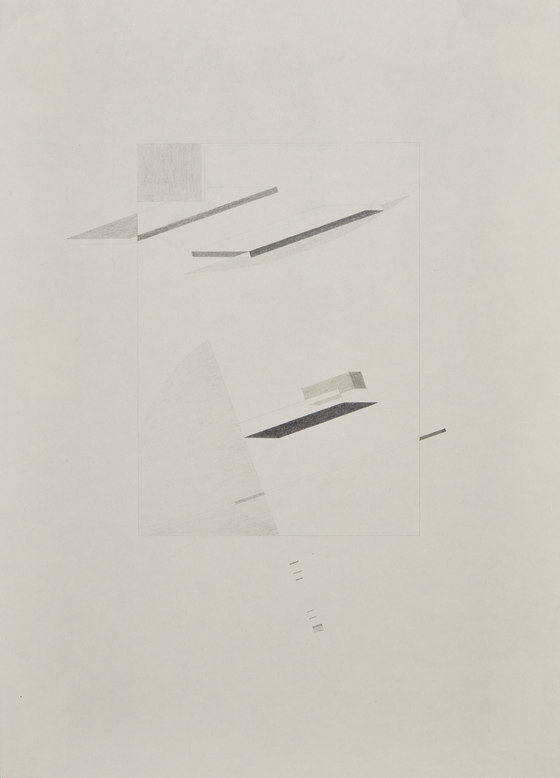Serpentine Pavilion 2018, designed by Frida Escobedo, Serpentine Gallery, London (15 June – 7 October 2018) © Frida Escobedo, Taller de Arquitectura
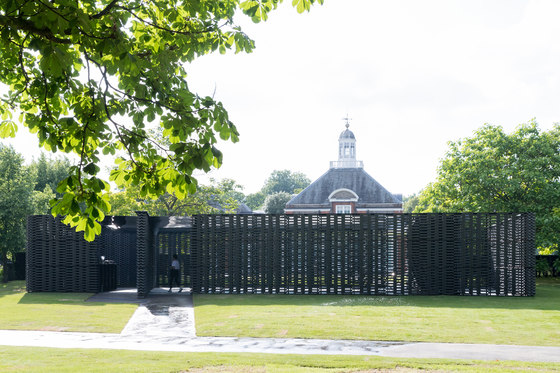
Serpentine Pavilion 2018, designed by Frida Escobedo, Serpentine Gallery, London (15 June – 7 October 2018) © Frida Escobedo, Taller de Arquitectura
×Serpentine Pavilion 2018, designed by Frida Escobedo, Serpentine Gallery, London (15 June – 7 October 2018) © Frida Escobedo, Taller de Arquitectura
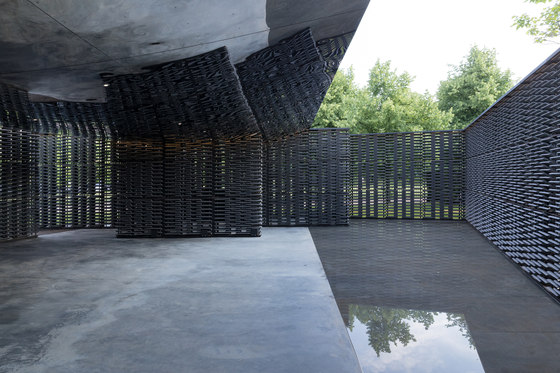
Serpentine Pavilion 2018, designed by Frida Escobedo, Serpentine Gallery, London (15 June – 7 October 2018) © Frida Escobedo, Taller de Arquitectura
×Serpentine Pavilion 2018, designed by Frida Escobedo, Serpentine Gallery, London (15 June – 7 October 2018) © Frida Escobedo, Taller de Arquitectura
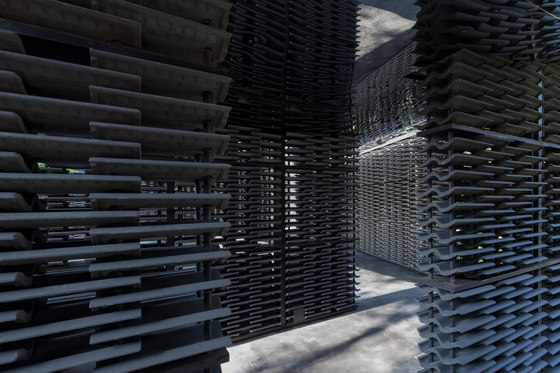
Serpentine Pavilion 2018, designed by Frida Escobedo, Serpentine Gallery, London (15 June – 7 October 2018) © Frida Escobedo, Taller de Arquitectura
×Frida Escobedo, an architect celebrated for dynamic projects that reactivate urban space, has designed the Serpentine Pavilion 2018. Harnessing a subtle interplay of light, water and geometry, her atmospheric courtyard design draws on both the domestic architecture of Mexico and British materials and history, specifically the Prime Meridian line at London’s Royal Observatory in Greenwich.
Escobedo (b. 1979, Mexico City) is the 18th and youngest architect yet to accept the invitation to design a temporary Pavilion on the Serpentine Gallery lawn in Kensington Gardens. This pioneering commission, which began in 2000 with Zaha Hadid, has presented the first UK structures of some of the biggest names in international architecture. In recent years, it has grown into a hotly anticipated showcase for emerging talent, from Sou Fujimoto of Japan to selgascano of Spain and Bjarke Ingels of Denmark, whose 2016 Pavilion was the most visited architectural and design exhibition in the world. Serpentine Galleries Artistic Director Hans Ulrich Obrist and CEO Yana Peel selected this year’s architect, with advisors David Adjaye and Richard Rogers. The Serpentine Pavilion 2018 is sponsored by Goldman Sachs in its fourth year of support.
Escobedo’s Pavilion takes the form of an enclosed courtyard, comprised of two rectangular volumes positioned at an angle. While the outer walls are aligned with the Serpentine Gallery’s eastern façade, the axis of the internal courtyard aligns directly to the north. Internal courtyards are a common feature of Mexican domestic architecture, while the Pavilion’s pivoted axis refers to the Prime Meridian, which was established in 1851 at Greenwich and later became the global standard marker of time and geographical distance.
British-made materials have been used in the Pavilion’s construction, chosen for their dark colours and textured surfaces. A celosia – a traditional breeze wall common to Mexican architecture – is here composed of a lattice of cement roof tiles that diffuse the view out into the park, transforming it into a vibrant blur of greens and blues. Two reflecting elements emphasise the movement of light and shadow inside the Pavilion over the course of the day. The curved underside of the canopy is clad with mirrored panels, and a triangular pool cast into the Pavilion floor traces its boundary directly beneath the edge of the roof, along the north axis of the Meridian. As the sun moves across the sky, reflected and refracted by these features, visitors will feel a heightened awareness of time spent in play, improvisation and contemplation over the summer months.
Escobedo’s prize-winning work in urban reactivation ranges from housing and community centres to hotels and galleries. In 2006, she founded her practice in Mexico City, with significant national projects including the Librería del Fondo Octavio Paz and an extension of La Tallera Siqueiros gallery in Cuernavaca. Her designs have featured at the Venice Architecture Biennale (2012 and 2014), the Lisbon Architecture Triennale (2013), and in San Francisco, London and New York. Recent projects include Stanford University’s Graduate School of Business and social housing projects in Guerrero and Saltillo, Mexico. She lectures nationally and internationally, and has won multiple awards and accolades. Escobedo’s design enhances the Serpentine Pavilion’s reputation as a space of encounter and shared experience, following Francis Kéré’s acclaimed 2017 Pavilion, a bright and airy structure that was inspired by the tree at the heart of his hometown in Burkina Faso and visited by more than 200,000 people.
The Serpentine Pavilion will once again be a platform for Park Nights, the Serpentine’s annual series of experimental, interdisciplinary commissions on selected Friday evenings. Supported by COS for a sixth year, Park Nights will present eight international artists each responding to Escobedo’s design and offering unique ways of experiencing architecture and live performance.
The Architecture Family Pack and Programme, also supported by COS, will give children and their families the chance to explore the Pavilion from playful and original perspectives. The Family Pack is designed by OOMK, a London-based art publishing collective. School groups are invited to join The Summer Studio, a series of movement based workshops with artist and dancer Zinzi Minott, exploring connections between her artistic practice and the Pavilion. Building on its 2017 success, Radical Kitchen returns on selected Thursday lunchtimes, supported by Aesop and in collaboration with Nicoletta Fiorucci. Artist, activists and researchers will gather with the public to consider different foodstuffs and elements, and their relationship to time, empire and landscape, themes inspired by the ideas behind Frida Escobedo’s design.
Frida Escobedo, architect of the 18th Serpentine Pavilion, said: “My design for the Serpentine Pavilion 2018 is a meeting of material and historical inspirations inseparable from the city of London itself and an idea which has been central to our practice from the beginning: the expression of time in architecture through inventive use of everyday materials and simple forms. For the Pavilion, we have added the materials of light and shadow, reflection and refraction, turning the building into a timepiece that charts the passage of the day.”
Serpentine Galleries Artistic Director, Hans Ulrich Obrist and CEO, Yana Peel, said: “We are delighted to reveal Frida Escobedo’s Serpentine Pavilion – a living timepiece in the park, powered by light and the Prime Meridian line. In its beautiful harmony of Mexican and British influences, it promises to be a space of reflection and encounter. We hope visitors of all ages will create their own experiences in the Pavilion this summer as we continue in our aim of bringing the urgency of art and architecture to the widest audiences.”
Richard Gnodde, Vice Chairman of the Goldman Sachs Group Inc. and CEO of Goldman Sachs International, said: “Over the past three years Goldman Sachs has been proud to support a diverse range of emerging young architects and we are delighted to continue our sponsorship this year. We are excited to see Frida Escobedo’s design come to life and we look forward to another engaging Pavilion and summer of activities at the Serpentine Galleries.”
David Glover, Technical Advisor said: "The Serpentine Pavilion is about providing the architect with the opportunity to use everyday materials in an innovative and creative way, challenging the user’s perception of architectural form and how buildings function. Frida has certainly delivered on this with her design, which generates a series of interlinked spaces that come alive through the clever use of light, shadow and reflection while maintaining a visual connectivity to the park. This Pavilion will delight and surprise its visitors.”
Architect’s Statement
The enclosed design for the 2018 Serpentine Pavilion departs from an apparently simple gesture, the nesting of two rectangular volumes positioned at an angle. While the outer walls are aligned in parallel to the Serpentine Gallery’s eastern façade, the axis of the internal courtyard is aligned directly to the north. The creation of an internal courtyard is a common feature of Mexican domestic architecture, and the pivoted axis refers to the Prime Meridian established in 1851 at the Royal Observatory in nearby Greenwich, the global standard marker of time and geographical distance. The intersecting planes produced by this simple rotation produce a series of irregular shapes and defined boundaries, with each area within the Pavilion encouraging play, circulation, contemplation and conversation.
The lattice walls of the Pavilion are inspired by a celosia, a traditional breeze wall commonly used in Mexican domestic architecture to bring air and light into the home. Here they are composed of cement roof tiles commonly used in the United Kingdom, arranged into a pattern that diffuses the visitor’s view, transforming Kensington Gardens into a blur of greens and blues. The selection of materials, which have a dark colour and textured surface have been chosen for their contrast with these environs.
Two reflective elements inside the Pavilion emphasise the movement of light and shadow within the Pavilion over the course of the day. The curved underside of the canopy over the central space is clad with mirrored panels, throwing reflected light across the space. To compliment the canopy, a triangular mirror pool cast into the foundation of the Pavilion traces its boundary directly beneath the edge of the roof, along the north axis. This thin veneer of water, only 5mm deep, provides a shifting reflection of the sky and surrounding treeline and roof of the Serpentine Gallery.
The movement of the sun across the sky, reflected and refracted by the pool and mirrored ceiling, encourages an awareness of time spent in shared experience and in contemplation. The design aligns material and historical inspirations from Mexico and the UK with a concept that has been central to our practice from the beginning — the expression of time in architecture through inventive use of everyday materials and simple forms. For the Serpentine Pavilion, we add the materials of light and shadow, reflection and refraction, turning the building into a timepiece that charts the passage of the day.
Frida Escobedo Taller de Arquitectura
Pavilion Architect: Frida Escobedo
Pavilion Architectural Team
Project Leader: Matthew Kennedy
Team: José María Gómez de León Federica Lombardi Andrés Harvey Héctor Arce Carlos Hernández Mario González Elisa Herrera
Project Directors: Hans Ulrich Obrist, Artistic Director, and Yana Peel, CEO Serpentine Galleries
Project Leader: Julie Burnell, Head of Construction and Buildings Serpentine Galleries
Project Curators: Rebecca Lewin, Curator; Joseph Constable, Assistant Curator; Serpentine Galleries
Technical Consultant: David Glover
Technical Advisors: AECOM, Jon Leach, Amy Koerbel, Michael Orr, Madalina Aghinitei, Katja Leszczynska, Jack Wilshaw, Sam Saunders, Carlos Lopes, Ulrich Groenewald, Javier Fanals
Town Planning Consultants: DP9, Barnaby Collins, Georgina Redpath
Construction: Stage One Creative Services Ltd, Tiff Blakey, Ted Featonby, Tim Leigh, Mark Johnson,
Health & Safety: Gallowglass, Steve Kearney, Managing Partner, Alan Blake, Site Engineering Surveys Ltd, John Gaffney, Jonathan Fox, Grant Fiddes
The Technical Department: Jeremy Singleton
Serpentine Board Of Trustees: Michael Bloomberg, Chairman
Sir David Adjaye OBE, Architect
Exhibition Patron: Lord Richard Rogers, Architect
The Royal Parks: Andrew Scattergood, CEO; Dennis Clarke, Head of Park Services; Andrew Williams, Park Manager
Westminster City Council: Hassan Lashkariani, District Surveyor’s Office (Building Control), Jenny Wilson, Licensing Authority; David Nevitt, Environmental Health Officer
Westminster City Council Planning Office
London Fire and Emergency Planning Authority
London Region, English Heritage
Friends of Hyde Park and Kensington Gardens
Serpentine Pavilion 2018, designed by Frida Escobedo, Serpentine Gallery, London (15 June – 7 October 2018) © Frida Escobedo, Taller de Arquitectura
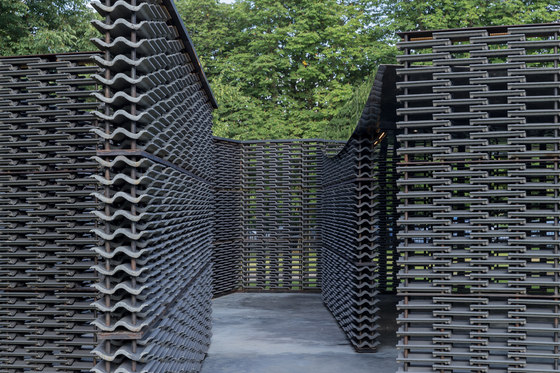
Serpentine Pavilion 2018, designed by Frida Escobedo, Serpentine Gallery, London (15 June – 7 October 2018) © Frida Escobedo, Taller de Arquitectura
×Serpentine Pavilion 2018, designed by Frida Escobedo, Serpentine Gallery, London (15 June – 7 October 2018) © Frida Escobedo, Taller de Arquitectura
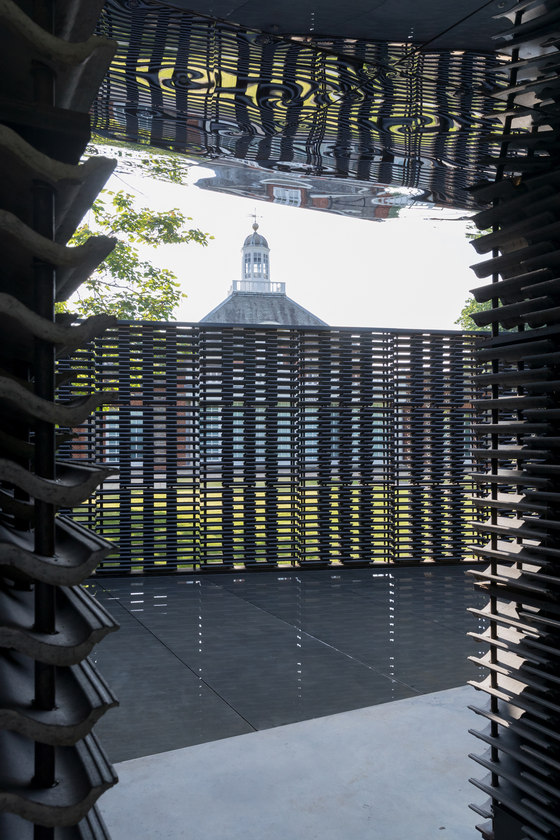
Serpentine Pavilion 2018, designed by Frida Escobedo, Serpentine Gallery, London (15 June – 7 October 2018) © Frida Escobedo, Taller de Arquitectura
×Serpentine Pavilion 2018, designed by Frida Escobedo, Serpentine Gallery, London (15 June – 7 October 2018) © Frida Escobedo, Taller de Arquitectura
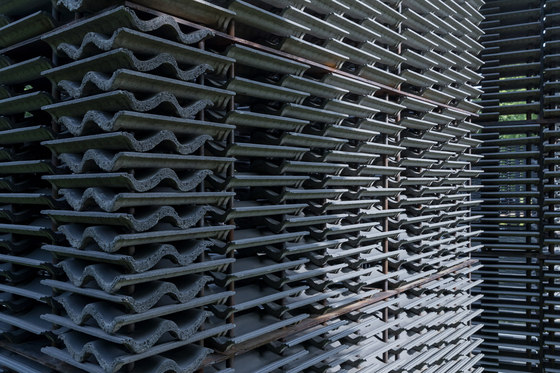
Serpentine Pavilion 2018, designed by Frida Escobedo, Serpentine Gallery, London (15 June – 7 October 2018) © Frida Escobedo, Taller de Arquitectura
×





